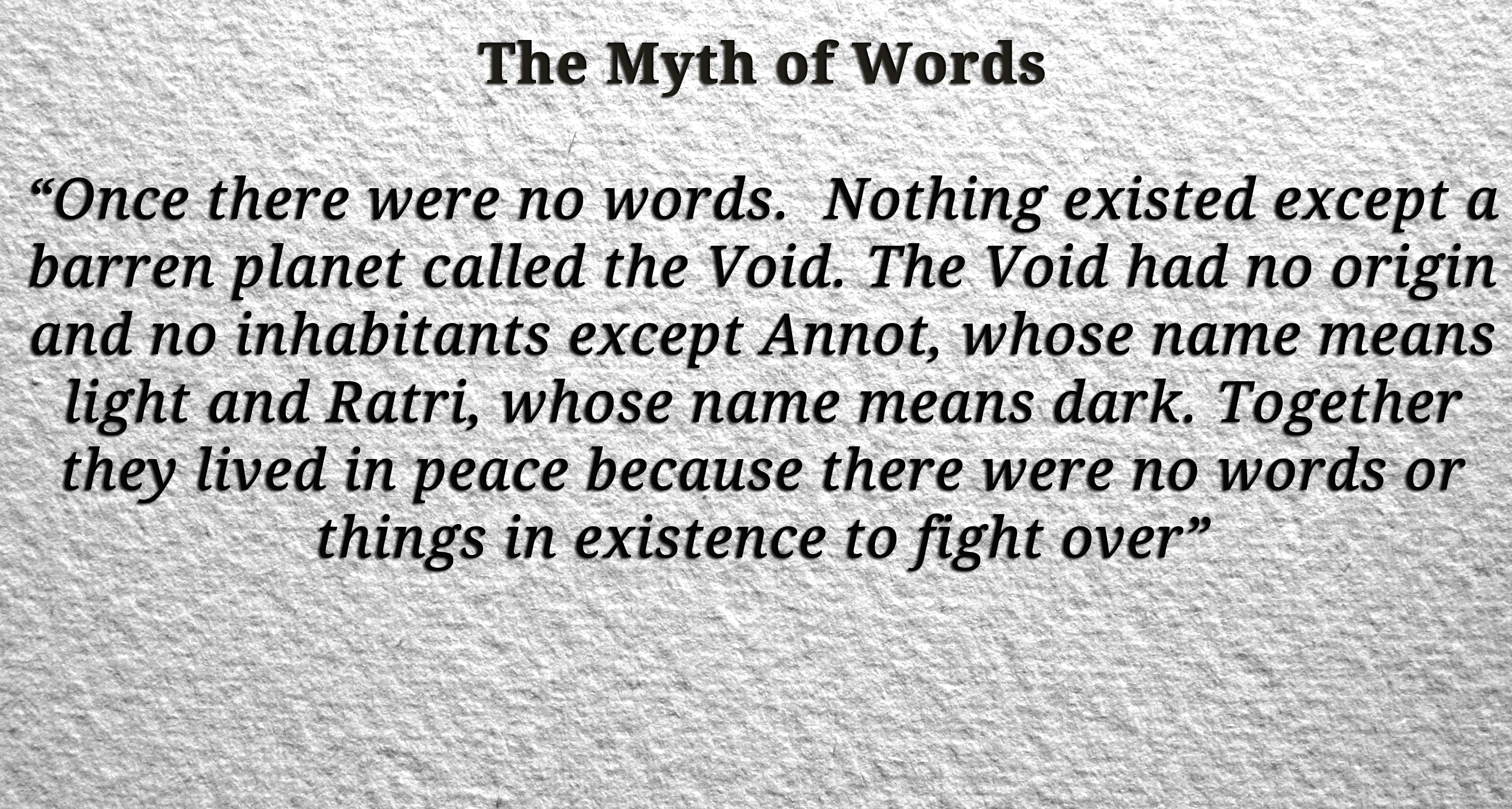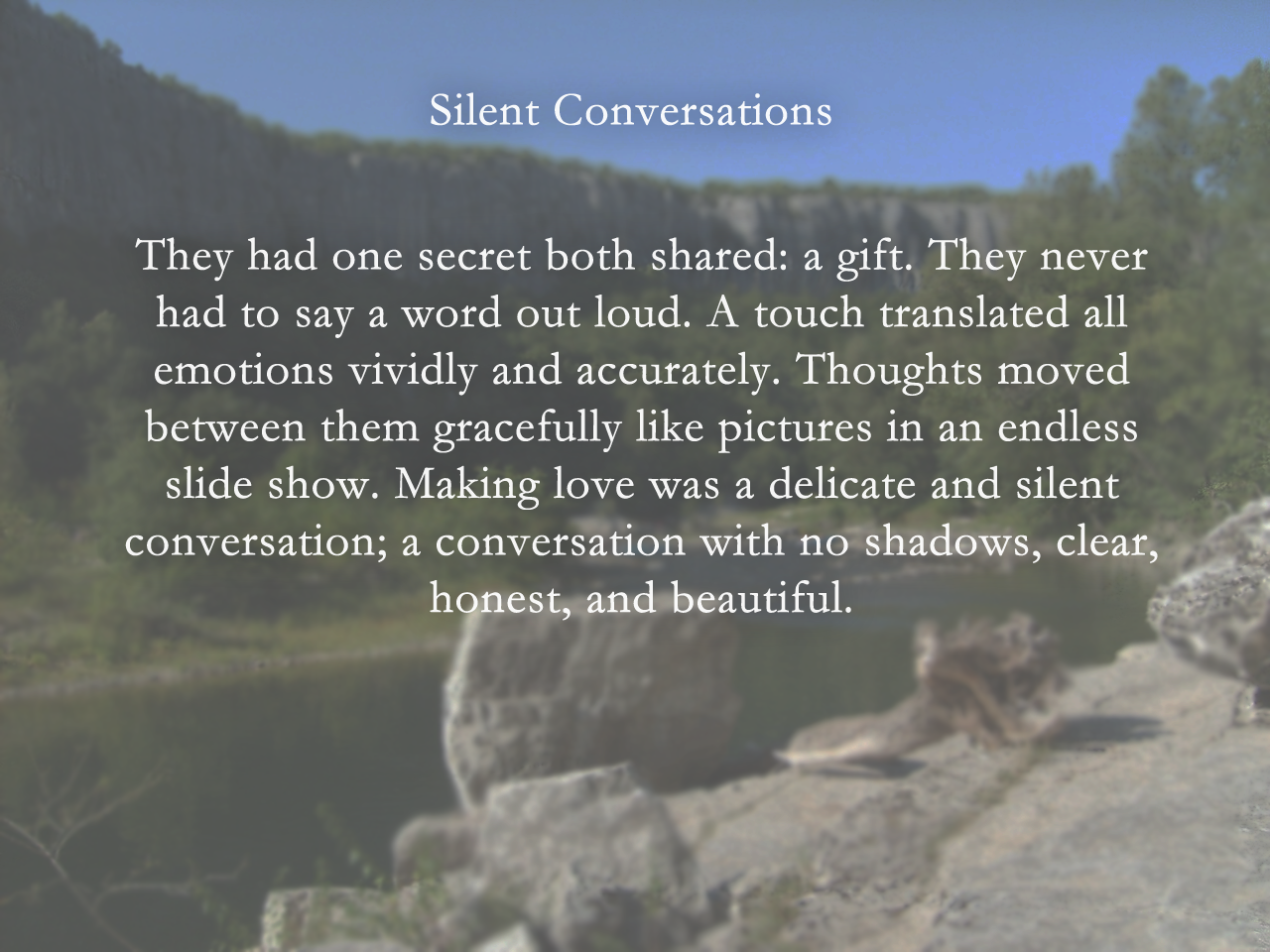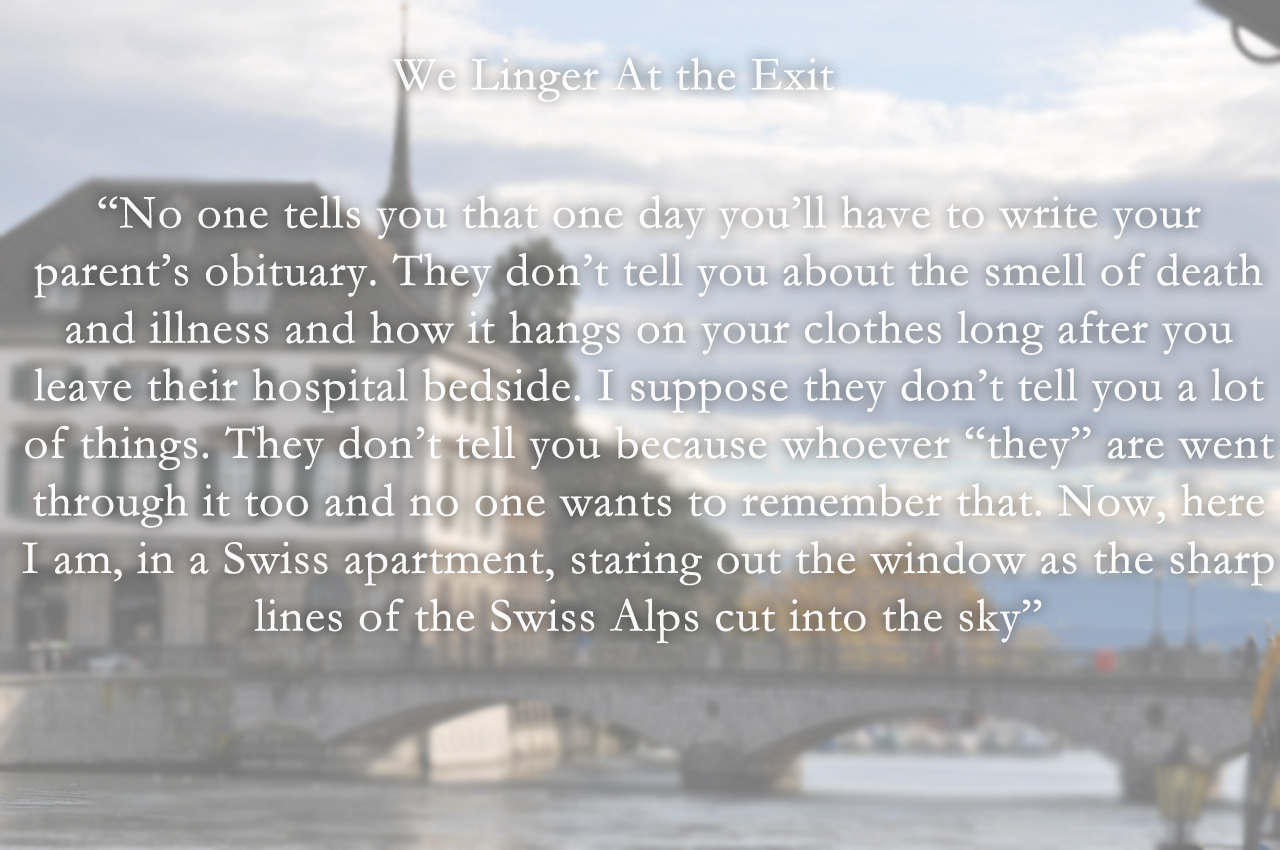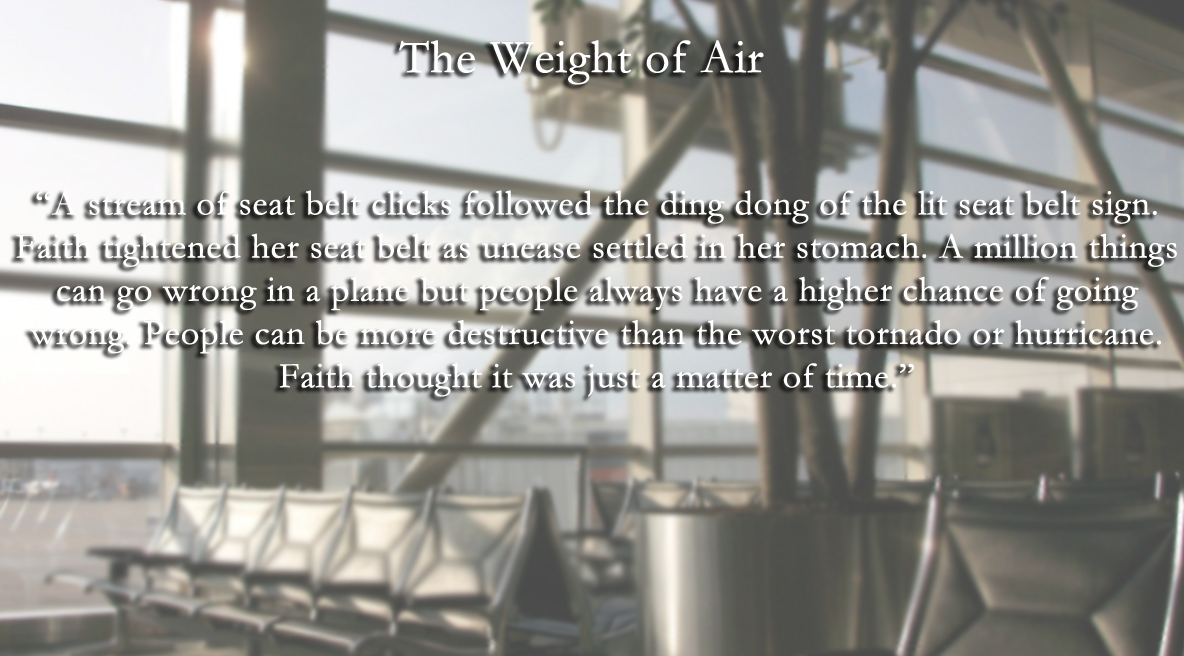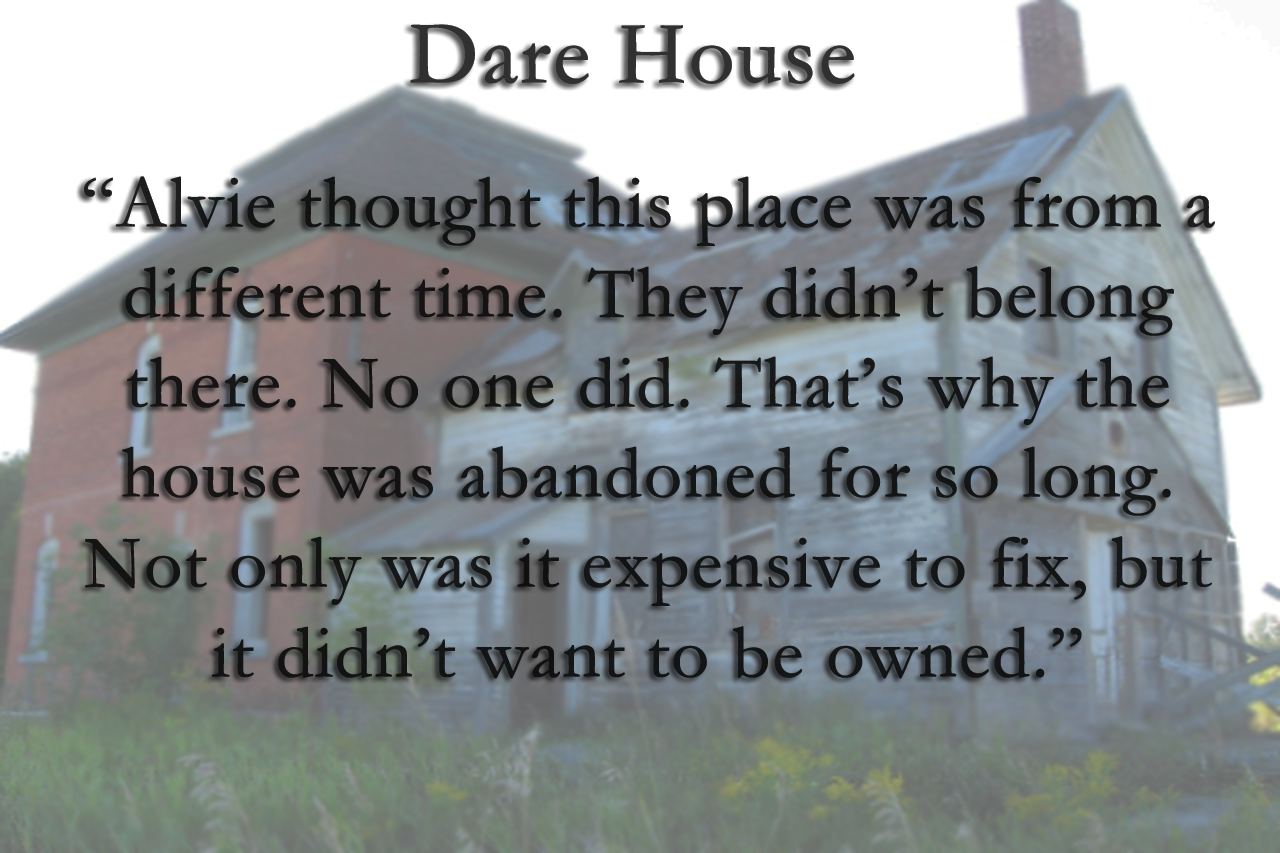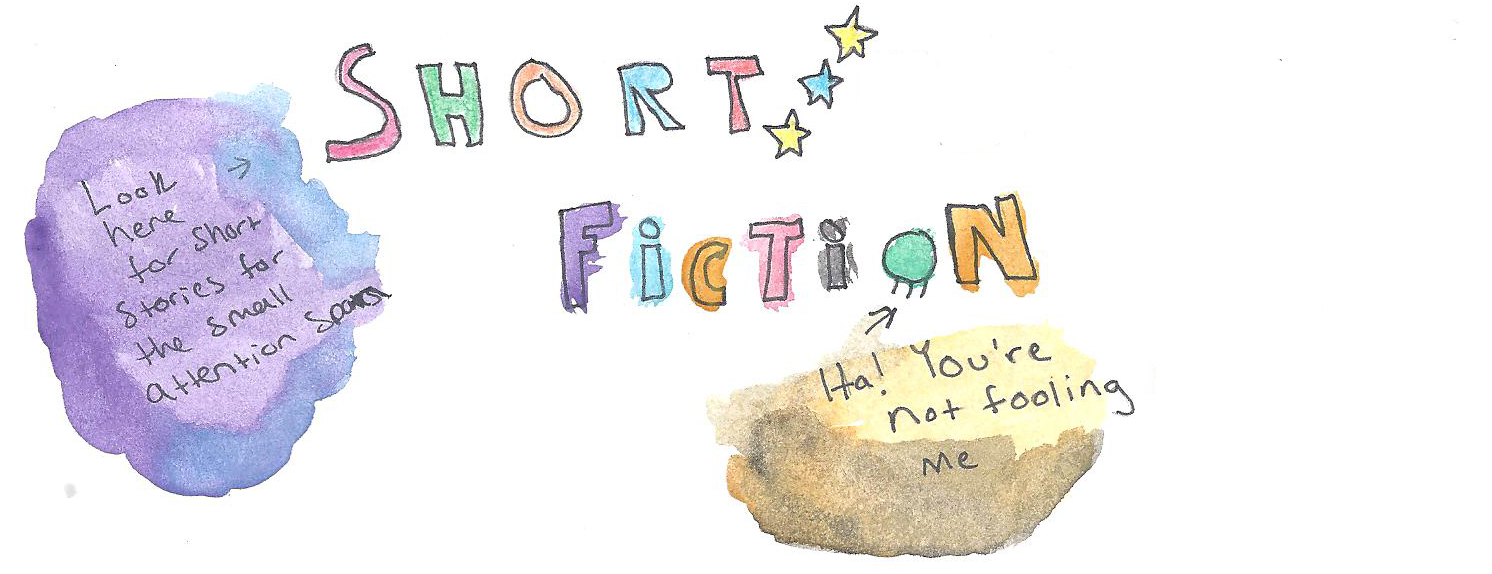
I wrote many of the following stories in college and they never seemed to leave me. I plan on expanding a few, I’m not really sure yet.
A writer tells her daughter the myth of words as she slowly realizes both of their lives are about to change forever.
Once there were no words. Nothing existed except a barren planet called the Void. The Void had no origin and no inhabitants except Annot, whose name means light and Ratri, whose name means dark. Together they lived in peace because there were no words or things in existence to fight over. Every day they walked their empty rocky planet thinking nothing, wanting nothing and finding nothing. Then one day as Annot and Ratri walked, Annot saw a glittering rock buried in the ground. The glitter of the rock bothered Ratri’s eyes and he wanted to destroy this thing that disturbed the darkness around them. For the first time, Annot wanted something. She wanted to protect this rock and learn its secrets.
One day Ratri and Annot fought for the rock and it slipped out of their hands, falling to the ground and cracking. A sliver of light broke through a small crack on the rock and they both watched as words spilled out of the rock and floated all around them. Suddenly everything around them and inside of them started to change. Beyond all darkness Annot watched as something happened and for the first time, she imagined. Annot imagined things and Ratri imagined things and they came into being. Annot created more worlds like The Void but with color. Ratri created the dark things on each world like fear, shadows, and sadness; all things he thought were good. Annot created a sheet of shinning balls of light that she called stars. She pinned the sheet above and around everything and the sheet was able to fold into itself to create more stars. The light from the stars angered Ratri.
“But mommy, why is Rat Tree angry at the stars?”
“Honey, it’s ‘Ratri’ and you have to let mommy finish the story. He wants the light hidden away and the rock and all its words to himself.”
Then Annot created a great ball of fire and light which shed light on all her worlds, destroying many of Ratri’s shadows. Ratri decided to steal the rock and break it open so only he could use all the words to create his dark things. Before breaking the rock, he created the moon to bring night and force the sun to share its place. Annot saw this and stole back the rock from him as he rested in his shadows. Then she decided to run away and protect the rock of words forever. Ratri realized the rock and Annot were gone and beyond all time and all the places they have created, he began to chase her…
“Mommy, mommy, MOMMY! Are you done now? Can I ask a question?”
Alana stared into the oak doors of the courthouse and for a moment lost herself in thought. Lucy’s voice pulled her back.
“Yes, Lucy, ask a question. The story isn’t done though.”
Lucy’s face could not hide her excitement and her eyes asked her question before her voice could.
“I’ll finish the rest when we’re done here.”
“Mommy, is Rat Tree gonna catch her?”
“I don’t know yet, baby, Mommy is still thinking about that.”
“Mommy, this chair makes my butt hurt.”
They were sitting on marble benches outside the courthouse waiting for it to open. Alana always hated the ostentatious gestures courthouses made to look greater than they were. To get a passport or paternity papers she had to pass through a rotunda with a high domed ceiling circled by art. Museums were places she wanted to be, she did not want to be here and the beauty of the courthouse would not change that. At least the DMV never pretends to be more than it is she thought. The cold marble bench sat under a tree which made it freezing. It began to numb her entire body as well. Alana stood up, stretched and swept Lucy up into her arms and onto her hip as she moved to the courthouse steps warmed by the sun.
Continue “The Myth of Words” on Scribd here.
Something dark shadows the unique relationship of Daisy and Dylan. Even though they can communicate without saying a word, they’ll have to do everything possible and impossible to get through the greatest tragedy of their lives.
Daisy King watched as the Goodwill truck turned the corner and disappeared with the last few boxes of Dylan’s baby items. Standing on the doorstep with a hand over her eyes to shield from the setting sun and a baby scrapbook in her arm, she noticed her husband’s car pass the Goodwill truck and slowly slink into the driveway.
Briefcase in one hand, Desmond stepped out of the car, planted a gentle kiss on Daisy’s lips and wrapped his other arm around her shoulders. Together, they walked up the steps and into the house and the sun wrapped itself in a blanket of trees far off in the horizon. In the kitchen, Daisy and Desmond were silent all for the usual exchanges that pierce dinner conversations and formal gatherings.
“So, how was work?”
“Oh, you know, same shit, different day.”
Desmond looked at his wife between sorting cans of beans and other camping items
Daisy picked up earlier in the day for their trip. Emotions had no hiding place on her face. Long, sleepless nights were drawn dark under her sad almond eyes. Fragile lines like delicate fractures on porcelain lined her face. Now washing dishes at the sink, her long black mane of wavy hair draped over her shoulder, Daisy stopped and looked at her reflection in the glass of the window. She was entering these states of daydream more and more. She was a writer and tended to drift. She would come back from her daydreams and madly scribble things on various notepads she kept in her pockets. Things were different with her daydreams now. They were deeper and reached a sadness that was hard to pull her back from. These were places Desmond could not go.
“Daisy?” He asked.
Dishes shifted under her still hands from the water and the sound of porcelain shook her awake. “What’s wrong, hon?”
“Nothing,” Desmond said. “You were just in a daze again. I didn’t want your hands to get all pruney.”
Daisy smiled at her husband and dried her hands on her “World’s Best Mommy” apron he had given her on her first and only Mother’s Day. She had forgotten to add it to the Goodwill boxes and decided it still had a function. She just wore it in reverse.
“You know when I went shopping today I bumped into Mrs. Walton at the grocery store. She told me it’s been a year and I’m still a young woman with plenty of time to have another baby,” Daisy said.
“What an insensitive bitch!”
“That’s exactly what I told her. I guess she was pretty offended and walked off before giving me her usual gossip.”
“Oh, that’s too bad.”
They both looked at each other and laughed and for a moment Daisy’s eyes filled with a recognizable warmth of shared thoughts, memories, and familiarities only soul mates understand. Like many married couples, they created and shared a language developed in the 10 years they had been together. However, they shared a deeper thread of this connection many find but so few ever keep. They had one secret both shared: a gift. They never had to say a word out loud. A touch translated all emotions vividly and accurately. Thoughts moved between them gracefully like pictures in an endless slide show. Making love was a delicate and silent conversation; a conversation with no shadows, clear, honest, and beautiful. They entered this state of communication casually and sometimes mixed their silent discussions with spoken conversation which would have sounded like a fractured exchange to anyone besides them. The only things they didn’t share were the things Daisy kept private in her writings and her thoughts when she daydreamed. Desmond could not enter those places and would never invade her privacy even if he could. Dylan’s squeals and cries had been the only thing that broke the deafening silence that occasionally drowned the house. In Dylan’s presence, Mozart, Pink Floyd, movie soundtracks, and fairy tales had a constant rotation in their CD player. Baby toys littered the living room floor like grown-up obstacle courses. The occasional “Shit,” that eventually morphed into “Poop” or “Darn,” was heard from a barefoot Daisy or Desmond. Sounds of musical winding playthings, squeaky toys, and rattles filled the home with warm noise. During this time Daisy and Desmond had more conversations out loud and once tried to silently converse with Dylan, but only found chaotic images and colors that had no concrete form yet, like a Picasso. He was almost a year and was too young for silent conversations, so they read and discussed things out loud in their effort to teach him language and help him understand the world was not silent but full of brilliant sounds.
Continue “Silent Conversations” on Scribd here.
The son of a once prolific author must finish his fathers memoir and write his obituary as his father makes one of the hardest decisions any human must make-how to continue life with dignity.
No one tells you that one day you’ll have to write your parent’s obituary. They don’t tell you about the smell of death and illness and how it hangs on your clothes long after you leave their hospital bedside. I suppose they don’t tell you a lot of things. They don’t tell you because whoever “they” are went through it too and no one wants to remember that. Now, here I am, in a Swiss apartment, staring out the window as the sharp lines of the Swiss Alps cut into the sky. I’m also writing my father’s obituary, making arrangements, and settling any outstanding debts with friends or family—my dad is not making any of this easier.
“Young Jonathan Clark was a bright and beautiful boy with talent unending…”
“Dad, I am not writing that!”
“Just hear me out, son. This is going to work if you just listen.”
Dad pats down his untidy gray strands of hair and leans over the end of his bed reaching down for papers in his briefcase. I reach down to give him the whole briefcase and he slaps my hand away.
“I don’t need the whole damn thing,” he says. “I just need a few papers. One in particular should help you with my obituary.” He spreads a stack of papers across his lap and leans over the bed again to reach for his briefcase. The white bed sheet over his legs stretches taut and the papers on his lap scatter to the ground. “Dammit! Why are you not helping me?”
“Dad, you’re not the easiest person to help,” I say, as I pick up his papers from the ground. “You want people to help you your way and not the best way they know how.”
“Don’t be dramatic. It does something ugly to your face.”
I toss the papers on his lap and sit down on the chair by his bed. I look out the window and watch small white specks float to the ground. The heavy November rain has stopped and soon December will spread its snowy white blanket over Switzerland. “Ok, I found it. I wrote it when I was 24, but it should still apply.”
Dad hands me a warn article clipping titled, “Song of Myself,” from his college newspaper. “Are you serious, Dad?”
“Of course! It’s appropriate,” he says. He’s pointing at the article in my hand, his index finger almost brushing my nose. I just want to slap his hand down, but I don’t. “The editors wanted me to write about myself, so I did. You’ll find some great material there. I wrote it when I was at my best.” Dad leans his head against the headboard and closes his eyes. I imagine he’s thinking about his best moments at Cornell: Delivering the valedictorian speech, marrying Mom during his senior year, and the attention he had received from selling his first novel while still in college. Actually, I don’t think he remembers most of his college experience anymore.
“Dad, you wrote it when you were at your most egocentric. I wish you would just let me write this on my own, the way it’s traditionally done. Why won’t you let me write it?”
His head is still against the head board and his eyes are closed. I can see his eyes dart back and forth under his veiny eyelids. He says, “Flourish, son, flourish. You can’t create it like I can.”
Flourish is what makes my father a bestselling science fiction author. He creates elaborate fantasies that weave into the imagination of his readers. After thirty years and fifty novels he’s gained money, awards, media attention, and the love and respect of fans. Critics and scholars admire his controlled, tight lines, which retain Dad’s grandiose and dramatic flair. He could be the love child of Lord Byron and Hemingway. If Hemingway only revealed one-eighth of the iceberg, my dad held the whole damn iceberg above his head. Dad’s right. I have no flourish. I rather leave part of my iceberg hidden.
We differ on the way we write, on our beliefs, and now on the best way to die.
“Ok, so continuing, “Young Jonathan Clark was a bright and beautiful boy with talent unending…”
“Dad, that just sounds so ostentatious,” I say.
“This is my last opportunity to sound ostentatious. Please, let me do a good job
of it.”
“Dad, I have to pick up Uncle James from the airport. We’ll have to finish this ridiculous conversation later.”
“Fine, while you do that I’ll call your mother and tell her how you’re bullying your father on his death bed.” Dad leans up from the headboard and pats down his ruffled hair. He picks up his cell phone and grins.
“Dad, you’re not dead yet.” I smile back and walk out the door. For a moment, I think of dialing the number for him, but I don’t and walk out into the cold air. Mom could use a break too.
Continue “We Linger At the Exit” on Scribd here.
Set after 9/11, Faith is a paranoid and disillusioned meteorologist, who believes a little pressure and time separates humanity from a path of destruction.
“Delta Flight 783 to Dallas-Fort Worth has been delayed due to technical issues. We apologize for the inconvenience and hope to have more information and a timeframe shortly.”
As Faith watched the information screen, a chorus of “Damn,” “Great,” and “This sucks,” circled behind her and echoed throughout Gate E15 at the Chicago O’Hare International Airport.
A man standing next to Faith said, “You better believe this is goddamn inconvenient. Delta assholes.” The man appeared about seventy years old and stood slouched. His eyes, dark slits hidden in the dropping folds of his eyelids, watched the “Projected Arrival” entry change from “February 7, 2000 4:00 PM” to “Delayed: TBD.”
Faith looked down from the information screen and at her watch. It was 3:30 PM. She sympathized with the old man’s bitterness. Delta had delayed or cancelled the last two flights she was booked on.
The old man walked around Faith and sat by chairs facing the gate agent’s desk, his eyes still pinned to the information screen above the desk. He smelled like Old Spice and soap. Liver spots covered the tops of his hands, his forehead and temples. He was bald and the lighting above cast a perfect halo around the man’s shiny head. With only a jacket on and a newspaper tucked under his arm he had no luggage or briefcase Faith could see.
Faith was still standing with her rolling carry-on, facing the information screen. She felt awkward, as if the center of attention shifted to her. At 5’11 barefoot she towered over most of her friends in Dallas and colleagues at the news station. Her boss joked that she almost didn’t get the job as the station’s meteorologist because of her height. “Americans want to see a female forecaster’s entire torso, not just her head and the ceiling.” He laughed and padded her on the back after he said it but Faith felt he wasn’t entirely joking.
Since most of the seats were taken at the gate, Faith sat next to the old man. Across from Faith a young man in a tank top watched as she sat down. He had one sleeve tattoo of a dragon, its mouth spewing fire on his wrist and its body coiling all the way into the arm sleeve. Faith saw another tattoo on his neck, peeking out of his shirt collar with a vaguely familiar shape. He smiled at her and she crossed her legs and looked down at her bag.
Faith tapped away on her BlackBerry, answering work emails. After years of schooling to become an atmospheric scientist she earned had her PhD and could go anywhere. She chose to forecast weather on the news for people who would no doubt curse her name under their breath for not predicting it would be ten degrees cooler at 6 PM than she’d forecast. For her, weather and atmosphere was always a science of unpredictability and the unexpected.
With all the technology and advancement in the research of tornadoes, scientists only knew that moist, warm air needs to interact with air that is cooler and faster in order to create one—that is the extent of scientific knowledge on tornadoes. There is no one hundred percent accuracy when it comes to any type of weather, but of course you never say that to the thousands of viewers wondering if they should take a sweater or wear a sleeveless shirt. Faith believed things were most likely to happen when we least expected it, so she always expected something.
“You look as if you’ve lost something,” the old man said. He watched Faith for a response and then turned back to look at the information screen. “Why is it that every damn time we need be somewhere on schedule something happens but we’re right on time when we have absolutely nothing to get to?” The old man’s eyes were still transfixed on the information screen while he spoke.
Faith realized the old man was speaking to her and for a moment debated whether to answer.
“I think that’s called Chaos Theory,” Faith said. “It was thought up by a meteorologist in the Sixties. The unpredictable will always happen because it’s not possible to predict everything and that’s the only thing we can depend on.” The old man slightly nodded his head as he scanned the information screen. “Science can tell us how the unpredictable happens but not why, where, or when.” Faith watched the old man for any reaction and continued. “Just a small change in the atmosphere now can drastically change the behavior of a system many years from now.” Faith saw the old man’s blank expression and thought she may have said too much.
The old man turned to Faith. “So, you’re saying some asshole mechanic had a bad night yesterday and that’s why we’re not in the air?”
“You can probably go farther back,” Faith said.
“Yeah, the government! It always comes back to our goddamn government,” the old man said.
Faith looked around to see if anyone was listening to their conversation and turned back to the old man. “I imagine it’s something more natural like a bird flapping its wings in California causing a tornado in Japan ten years later. Really, it only takes a little bit of pressure and time to cause absolute anarchy in our environment,” Faith said.
“I know about pressure,” the old man said. He looked at Faith for a moment and his narrow eyes grew wide. “I know you! You’re the tall weather lady on ‘Forecast with Faith’. I saw your show this morning. You look better in person.”
“Thanks, I guess. Um, that may be my last show. I had an interview for a position at the National Weather Service in Chicago which went well, so hopefully I won’t be the ‘tall weather lady’ anymore.”
“Unless something goes wrong of course. Your whole chaos theory would blow that plan to shit,” the old man said. He looked away from Faith, stared at the tattooed man sitting across from them and smiled. The tattooed man looked away.
“It’s not really my theory,” Faith said. “I was just trying to explain…”
“Your last show, hmm? There is an interesting finality about that. Almost sad but freeing, don’t you think?” The old man was now looking back up at the information screen as he spoke to Faith. “Humanity is swimming in a stinking cesspool of disappointment. Why should we get our hopes up, right?” The old man unfolded his newspaper and read.
Their conversation had taken a strange turn and she was happy it was over.
Continue “The Weight of Air” on Scribd here.
Thirteen year old, Alvie Sparks is dared to prove himself after being humiliated in school. Now Alvie must find a way to make it through Dare House while finding the courage to save his friend.
“Alvie, are you listening to me?”
The morning light peeked through the kitchen window creating dancing figures on the kitchen linoleum. The clanking of dishes in the sink, the water running, and the gentle tone of his mother’s voice blended into one drone, and Alvie Sparks lost her somewhere between, “You shouldn’t hang out with those boys…” and “…to me?”
“Sorry, Ma,” Alvie said. That was the best answer he could muster and for once it happened to be true. Alvie’s mother continued head down over the sink, arms in the soapy depths determined to, as Alvie’s father would say, “…rub the pretty right out of the porcelain.”
“I just wish you wouldn’t get into so much trouble, dear. And now look at
your knee. Your father will probably have something to say as well.”
Alvie was about to say his father wouldn’t have minded, but he thought it better to keep quiet.
Alvie moved his gaze from his mother down to the fresh scab on his right knee. It’s been three days, shouldn’t this start peeling by now? Alvie wanted it to peel, wished it to peel. He dared it. He imagined himself picking and pulling at it until a portion of his sticky, oozing knee muscle became exposed. He would terrify his mother and awe his friends that he could sustain so much pain. No one would call him a coward. Alvie wanted to redo his last week of school before summer. He actually wanted to redo the whole 8th grade, but figured that was too much to even pretend to ask. The day it happened, all he could remember before the hard drop and the proceeding school yard laughter was Mike Reilly looking down on him and mouthing the word “Coward.” Suddenly, his fresh scab became itchy, he was pulled from his memory and he gently scratched around the pink edges of the scab.
“Dear, don’t do that. Give it time to heal.”
The light through the kitchen window hit his mother’s auburn hair and highlighted her cheek and part of her eye. For a moment she looked like she was wearing some exquisite masquerade mask, the kind Alvie’s grandmother would show him in her dusty books when he was 7 years old. Most of the masks had an air of menace that gave him nightmares. Long claw like noses, distorted and melting frowns, swirls of deep ruby reds melted with pitch black shapes, expressions he couldn’t understand. Stupid masks. I was a coward even when I was little, Alvie thought.
Alvie’s lanky frame moved across the yard of their modest home on Station Avenue. His legs moved at a steady pace and the rest of him followed. He walked slightly hunched with his head down and he started his familiar habit, his summer ritual of sliding his hair behind his ear every 5 minutes. It wasn’t very long, just long enough to be annoying. As it was the start of summer his parents didn’t bug him about getting a haircut. He crossed the street and weaved around rusted jalopies, long abandoned and made it halfway past Station Avenue when Jerry Milton joined him. Jerry had to walk a few paces faster to keep up with Alvie who never slowed down, causing him to awkwardly slow down and speed up his pace until he could find Alvie’s rhythm.
“Hey, so what are we doin’ today?”
“I don’t know, maybe go down to Ketch’s place and hang out,” Alvie said.
“I was thinking we can hang out and get some soda pop. My parents
gave me some money and I can get us all some. What do you think?”
“Soda pop? Yeah, sure. I don’t care.”
Alvie thought they must have appeared very contrasting figures from afar. His long body was vastly different from Jerry’s small square frame. Despite being from the same side of town their clothing was vastly different. Alvie had thrown on jeans, a white shirt, and some scuffed sneakers. Jerry had chosen to dress in a blue polo shirt, grey flannel pants, and penny loafers. Adopting the habit of his parents, Jerry always took care with what he would wear by choosing it the day before. During a camp out in Ketch’s yard, Alvie, Ketch, and Glen Porter had all watched Jerry through the living room window after he finished brushing his teeth. He gently folded a black polo shirt and trousers across the back of a chair and tucked white socks in his shoes that were neatly lined up under the chair. Alvie figured Jerry’s parents couldn’t afford the best house in town, but they made sure their kid would be the best dressed in Linebridge Junior High. When Jerry came back out, the boys continued to talk about monster movies, baseball, and the strange mole on Mrs. Carpenter’s face that they swear would grow or shrink on any given day predicting how much homework they would receive.
It smelled like summer to Alvie. Walking towards March Court the aroma of barbeque entered his nostrils and created a painful stab in his belly. With only a piece of toast in his stomach after running out of the house, he was hoping Ketch’s home was the source of that sweet summer smell. The homes in March Court intimidated the trees with their imposing grace and stature. They were beautiful but Alvie was more impressed with the grass in each lawn. The “Home of Drake”, as the boys dubbed it, had the best lawn in March Court, and no doubt in the whole town. It was the greenest and softest lawn around. During their camp out, they were all able to tiptoe at night barefoot from their tents in the yard to the bathroom in the house. Alvie had likened it to a fluffy carpet; squishy and ticklish at the same time and not a bald spot to be found.
“Ok, I’ll wait here while you knock,” Jerry said. “Jeez, it’s hot, so tell him
to hurry up, will ya?”
“Why don’t you just come in with me then if you’re so hot?”
“We’re just gonna go in, get all comfortable, and come right back outside.
No point.”
Alvie sometimes wanted to say things to Jerry, to make him stop acting like such a baby, but he figured he was no one to talk. Instead, Alvie sighed and walked to the double French doors and rang the bell.
Ketch greeted him at the door with his easy smile and no questions. He drifted passed Alvie and leapt the four steps from the door to the walkway and landed with a loud thud from his loafers. Jerry shook his head at the display like a scolding grandmother.
“You know you can hurt your ankles like that, not to mention your
knees.”
“Hey J-Bird! I saw something in Popular Science about worry-warts. The
little veins in their temples pump so hard that it sends a rush of blood to the heart, gives them a heart attack and sends that blood back to their head.
You know what happens then?”
“No. What happens? And stop calling me that!”
“Their heads explode. It’s not so bad since they’re already dead from the
heart attack and all,” Ketch said. “And why not J-Bird. Your mom calls you that.”
“You’re not my mother! And that’s a fat lie if I ever heard one. That
wouldn’t even be in Popular Science it would be in some medical magazine or something.”
“Well, they were describing a helmet you can wear to prevent that sort of
thing. It constricts the temples and doesn’t let you see anything so you don’t worry. Isn’t that great, Alvie? Huh, isn’t it?”
Alvie smiled back at Ketch and nodded just wanting to get on with the day.
“Yeah, sure Ketch, that’s great.”
“That’s pretty funny. I’m sure it took you awhile to think of that one.”
The boys finally started to make their way out of March Court. The sun became a relentless stifling heat that choked any breeze heading their way.
“Don’t be sore, J. I’m still your best friend despite your lack of scientific
breakthrough knowledge.”
Alvie was sure if Jerry wasn’t sore already, he was after that little comment. First, Jerry hated for anyone to think he didn’t know something. Second, the boys were all good friends since 5th grade, but Alvie had known Ketch since 1st grade. He had known him before the boating accident in Ketchikan, Alaska where Dennis Drake almost drowned but emerged from the frigid cold blue water alive as Ketch. The day it happened, Alvie felt it but knew his friend was fine and would be back from vacation with his familiar smile and stories to tell. They shared a connection. They had never really talked about it but it was something all the boys knew. The day Alvie was shoved to the ground by Mike Reilly landing painfully and awkwardly on his knees directly in front of Mike instead of on his bottom; Ketch was there to help him up before the entire school had seen. Ketch was as tall as Alvie, but slightly more muscular with striking features and neatly trimmed black hair.
“Shove that dare up your ass and never call a friend of mine coward!” Ketch had said. Mike didn’t respond, just laughed and walked away.
“Stop thinking about that idiot. He’s not worth it.”
Ketch’s voice broke the silence as they made their way to the General Store for some Cokes. Alvie didn’t say a word, just nodded.
“We have something to do after this, you guys. We need to meet Glen at
Dare House.”
“What? Why? Mike will be there. You told him to shove the dare up his
you-know-where,” Jerry said.
“Shut up, J. You know why!”
They both turned to Alvie who still hadn’t said a word. He took a sip of his Coke and let the drops of condensation on the bottle run down his neck and mix with the salty beads of sweat.
Continue “Dare House” on Scribd here.
